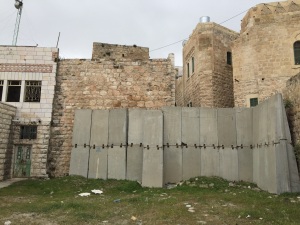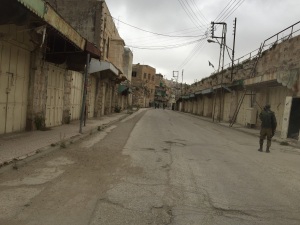I knew I was starting to get a cold last Sunday while getting ready to leave Scotland but I wasn’t going to let that happen. I’ve been spraying ‘first defence’ into my nose ever since with the result that my cold has merely been suppressed into miserable, voice losing, low grade chest and sinus misery – until yesterday.
Having spent the morning on site lugging bricks along our human chain (to you, to me, to you….) our leaders decided that more could actually be achieved with less non buildery, eager to help, middle aged type people actually there getting in the way.
Leaving a handful of the most useful volunteers with the builders the rest of us were herded towards and climbed on the bus and made our way to Hebron. I was told I had to go, this is one of the places our project organisers demand we experience.
Getting off the bus in Hebron I feel like I have returned to medieval times. We are warned to keep together – our Palestinian friend at one end of the group, our project leader at the other. My sinuses are getting more and swollen and painful, the light is too bright and the atmosphere is heavy with tension.
It quickly becomes clear that all of the roads are designated as either Palestinian or Jewish. Soldiers with guns slung loosely on their hips guard the corners where the two intersect. They watch our group making its way nervously through the old market streets towards the mosque, from the watch towers on the rooftops.
The town is divided into the sectors of H1, controlled by the Palestinian Authority, and H2 controlled by the Israeli Defense Forces. Area H2 is mixed and home to 30,000 Palestinians and around 500 settlers. There are armed check points and signs at street junctions declaring streets to be off limits to Palestinians, or to settlers. High, ugly concrete barriers firmly divide the segregated areas.
Children appear in a mini swarm with Palestinian bracelets for sale, insistent and demanding like street children anywhere. “You buy please? 5 shekels. Life is very hard help us please.” We have been instructed not to give money to them as they will not leave but keep coming for more. I feel bad and place my hand on my heart as I say ‘no thank you’ – adding quietly a smile and a ‘darling’ to the end of the phrase as I would do back home in the face of clamouring wains. They are all beautiful little boys.
Many of the children here have no other way to help bring money into their homes. Many do not go to school. Where poverty of hope claims supremacy, the fight to ensure your child receives an education can be defeated through the real fear of them being attacked by settlers or bullied or even arrested by the soldiers on their way to school. All children who are encouraged to go to school are accompanied in groups by peace volunteers who try to keep them safe. They are searched at check points, scanned by metal detectors and then – at the end of the day have to brave the journey all over again. It’s the teenagers who are at most risk of arrest – like young people everywhere there capacity for risk assessment, their short fuses re tolerance for injustices, their thinly veiled contempt for their ‘oppressors’ (many only two or three years older than themselves) can lead to volatile situations where injury and arrest are commonplace outcomes. Children can be arrested and held without any charge for up to four days and can be transferred to adult prisons with no special protections. Their families may also be targeted in response to transgressions. We meet a man in the old market area who presents to us his boys – neither older that 10. They sleep in their clothes, he tells us, so often do soldiers raid his house in the night they need to be ready. This is usual – children to be taken from their beds and questioned by gun toting soldiers. The aim is to disrupt lives, to encourage people to leave.
The settlers children go to the religious schools. The children of this town will never be able to learn and grow together.
The family’s house is only meters from the homes of some of the 500 or so settlers who have moved into Hebron. They seized what were originally Jewish houses in the central market area then built up on top of them. The Palestinians who live in the homes beneath and the resistant market traders who have managed to continue to trade despite the forced closure of streets and shops in the area, protect themselves from the litter thrown down upon them by the settlers by way of netting slung up over their heads. Sometimes we are told it is liquids. The younger son mutters to his father who then turns his older son’s face around so we can see his left eye, injured when acid was thrown at the children as they were making their way to school one day.
I cannot believe what I am hearing. How can this dehumanisation of another group of people be happening when the players understand in the most horrific of ways the impact of such racial and religious hatred?
I ask if the soldiers dotted around on the rooftops or on the watchtowers or on the streets intervened. No, they do not I am told. It is not their job to intervene it is their job to protect the settlers. There are 2000 of them here to protect the 500. The Palestinian police are not allowed to be armed so it is difficult for them to intervene in these situations.
My head is throbbing and I feel clammy. I don’t know if I am getting more ill or if the reality of walking through apartheid is taking me to the edge of an emotional place I don’t feel strong enough for.
Hebron is a hot spot because of its biblical significance. Looming above the city is the Tomb of the Patriarchs, the recognized resting place of Abraham, Isaac, Jacob, and even Adam and of course all their holy women folk. In religious terms it is the most significant place on earth for Muslims, Christians and the Jewish people and therefore the incentives offered to Jews by the Israeli authorities to settle there are many. This place is the most valuable prize in the West Bank.
Despite the numbers of Palestinians that live in the town it feels creepily quiet except around the mosque and synagogue (half of the mosque is now walled off so Jews worship on their side, the Palestinian Muslims on the other). We line up at the check point before the entrance to the Tomb. We need to have our passports ready for checking although this scanning of foreign passports by the soldiers is, I am told by our Palestinian friend, beyond their actual authority. I don’t intend to test out that theory, I remembered with panic just before entering the turnstile that I had still had my concrete dust covered builders gloves in my pocket. Nothing happens, and I am filled with relief when I am nodded through.
We are moved around from mosque to streets – sometimes with our Palestinian friend and sometimes not as we can go to areas he is not allowed to. It’s like herding cats and I am impatient to leave, to find the bus, to get out of here.
He shouts as we pass a shop with tables and chairs outside. He is there smoking (always smoking!) with his friends who sell pottery. They beckon us over for hot, sweet tea or for coffee. I gladly accept and then buy presents for my children and my sisters from their shelves, glad to be able to support their local economy. I have no idea how any of the traders here are managing to make a living.
Slowly, slowly the group gathers itself and gets back to our bus. I feel sick. I know I have a temperature. By the time I am back at the hotel I can hardly keep myself upright. I am full of grief and tears keep escaping. I don’t know if it’s the impact of seeing for myself how generations of fighting and hatred between people just seems to create ever rolling, undefeatable, ongoing hatred. Is that what negative energy does? Just feeds itself for ever? Where is the hope in that? Maybe it’s because I am ill, maybe it’s because tomorrow is my Dad’s birthday and I miss him and wish I was going to be with him.
It is obvious to the others that I have rapidly deteriorated and our project leader seeks me out to tell me that I should consider taking the build day tomorrow off so I can be in better health for Saturday’s planned trip to the cultural association, youth theatre project and women’s association I am so excited to visit.
I am so grateful to him – how did he know that I need a grown up to tell me I am ill and therefore am not allowed to go to work before I can ever give myself permission to take some rest time and recuperate?
We will see what tomorrow brings. Today has brought enough. I need to go to bed.


Wow Katie, what a journey. Thanks so much for taking time to share the realities of life over there. Especially when I imagine you need your bed! Hope you have rested well and good luck with the rest.
LikeLike
katieB, you are an incredible woman! Not only are you courageous but you are also a mighty fine writer. Had a walk with you in Hebron and it was powerful and moving!
Hope today was more gentle! Happy Birthday. Xx
LikeLike